ARTICLE AD BOX
19 minutes ago
Mark Savage,Music correspondent

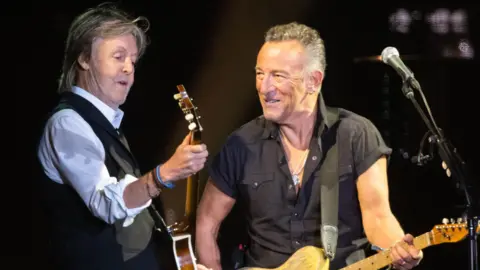 Getty Images
Getty Images
The duo played together at the Glastonbury festival in 2022
Sir Paul McCartney affectionately mocked Bruce Springsteen, as he presented him with a prestigious prize at Thursday's Ivor Novello Awards.
Springsteen was in London to receive the ceremony's highest honour - a fellowship of the songwriting academy.
He is the first international star to receive the award, and Sir Paul said he "couldn't think of a more fitting" recipient... "except maybe Bob Dylan".
"Or Paul Simon, or Billy Joel, or Beyoncé, or Taylor Swift," he added. "The list goes on."
"He's known as the American working man," Sir Paul continued, "but he admits he’s never worked a day in his life."
And he imagined how Springsteen would have fitted into the Beatles, before deciding: "When it comes to talent, he’d definitely be in the top five."
Springsteen took the jibes in good humour, hugging Sir Paul as he took to the stage.
His voice was hoarse and squeaky, after playing a rain-soaked, three-hour concert in Sunderland on Wednesday night.
But he said he never considered cancelling the show.
"We came out last night, and I was like, 'What is this weather? Driving rain, wind roaring"
"But standing in front of me, in the rain, I realised: These are my people."

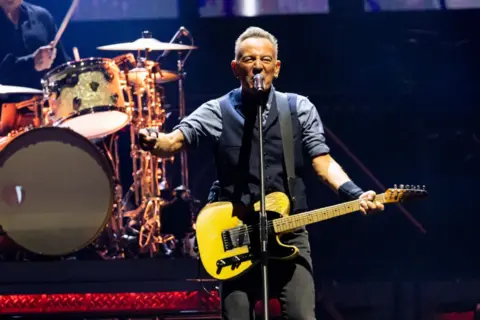 Getty Images
Getty Images
Springsteen is in the middle of a European tour with the E Street Band
The star also recalled how the UK had become a second home, despite initial reservations when he first came to London in 1975.
"The airplane food was not so great, and my first thought when we landed at Heathrow was, 'Where's all the cheeseburgers?'
"The cheeseburgers had either been hidden or replaced by something called fish and chips. It was a little disconcerting.
"Then our next stop was the Hammersmith Odeon, where I was greeted by a huge sign announcing: 'London is finally ready for Bruce Springsteen'.
"And all I thought was, 'If London isn't ready for a cheeseburger, they may not be ready for me!'"
But Springsteen was warmly received at the Ivor Novello Awards, with the crowd gamely cheering him on as he played a croaky version of Thunder Road.

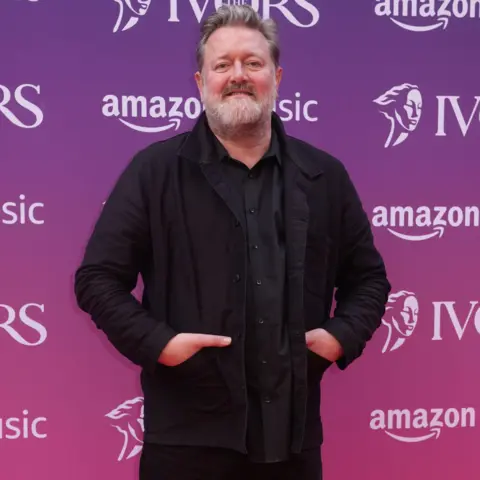 PA Media
PA Media
Guy Garvey was among the attendees who praised Springsteen for his craftmanship
Springsteen is only the 27th person to receive the fellowship of the Ivors Academy - joining the likes of Sir Elton John, Joan Armatrading, John Barry and Kate Bush.
The induction marks his impact on culture over the years, having sold more than 140 million records and won an Oscar, a Tony and 20 Grammy Awards.
From the full-throttle drama of his early songs, to the commercial heights of Born In The USA and the more introspective, political themes of his most recent albums, the star's music has channelled the frustrations America's working class into stadium-shaking rock anthems.
Elbow's Guy Garvey was among the star's fans in the audience.
"He's carrying the torch for folk music in the world of rock," he told the BBC.
"He's a force to be reckoned with. There's only one boss."
Sir Paul also relented during his speech, recalling how Springsteen had kept a promise to join him onstage at Glastonbury, even after his set was delayed for several years due to the Covid-19 pandemic.
"He's a lovely boy," he laughed.
Another victory for Raye

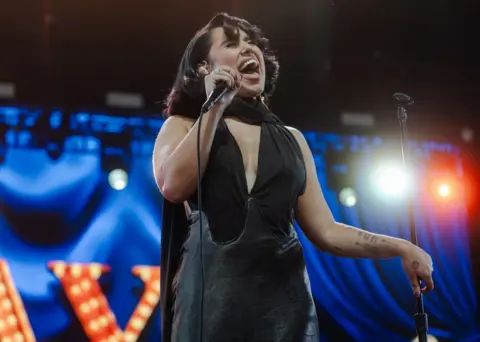 EPA
EPA
Raye was named songwriter of the year
Elsewhere, London-born pop star Raye capped an incredible 12 months with the award for songwriter of the year.
The singer, whose hits include Worth It, Prada and Escapism, won the same prize at the Brit Awards in March.
"It's a validation that I've yearned for my entire existence of being a songwriter: Being seen and being taken seriously," she told the BBC.
The 26-year-old was described by Ivor judges as having “the voice of a generation” after the release of her chart-topping album, My 21st Century Blues.
She used her victory speech to demand better pay for backroom songwriters.
Likening their share of royalties to an author who "doesn't get paid for a best-seller", she told the BBC: "It's wrong and it's sad and it breaks my heart".
Lana Del Rey rejects sexism

 Getty Images
Getty Images
Lana Del Rey posed with her award backstage
Lana Del Rey won the special international award, recognising her impact on a generation of songwriters.
On stage, the star remembered being criticised at the start of her career for writing "navel-gazing" songs about "challenging relationships", often tackling subjects of abuse and violence.
But she said time had proved the importance of those lyrics.
"We're seeing a huge amount of things written about difficult relationships," she said. "And when Covid began in the US, interpersonal relationship violence increased by 300%.
"So I just think it's amazing that female singer songwriters [now] have the freedom to write about absolutely whatever they want."
Backstage, the star told the BBC that, despite her critical acclaim, she had often suffered long periods of writers' block.
"It could be a year, or two," she said. "Passion comes and goes like the wind - but music is like the bird behind me. It just follows me around."
Skepta raises AI concerns
Dave and Central Cee's summer anthem Sprinter was named the year's "most performed work", after it became the UK's longest-running number one rap song, holding the position for 10 weeks.
The award was Central Cee's first Ivor Novello, and Dave's fifth.
On stage, Dave said the prize proved the "importance of original harmony" in a genre "filled with samples".
Skepta was recognised with the Visionary Award, for his role in pushing grime music into the mainstream.
On stage, he urged his fellow songwriters not to be discouraged by the threat of artificial intelligence.
"We might feel that what we do has no value any more, that technology can do what we do," he said. "But our talent is not something that can be taken away."

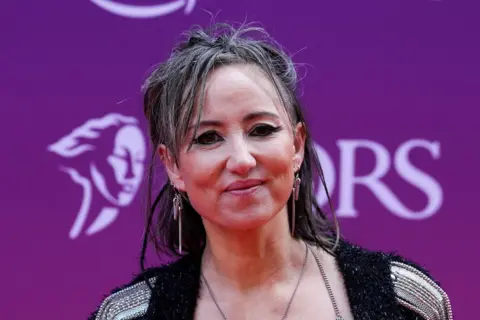 Reuters
Reuters
KT Tunstall won outstanding song collection
The sentiment was echoed by Scotland's KT Tunstall, as she was awarded the outstanding song collection prize.
"You're doing your soul's work," she told the audience, which included stars like Paloma Faith, Sampha, Tom Odell and Blur.
"And I think human beings can recognise honesty and authenticity. They can recognise when it's a person - and I don't think that's going away."

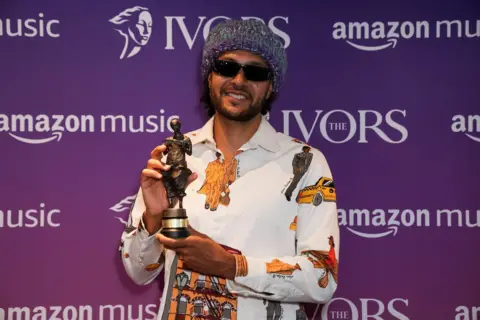 Reuters
Reuters
Yussef Dayes said he was "amazed" to win album of the year
The Ivors, as they're known, are prized by musicians because they recognise achievement in songwriting, instead of commercial sales.
That allows the judges - who this year included Katie Melua, Jack Savoretti and Kwabs - to shine a spotlight on acts who might otherwise have flown under the radar.
This year's best album prize, for example, went to south London drummer/producer Yussef Dayes for his ireepresibly soulful debut, Black Classical Music.
An intoxicating blend of styles, cultures and sounds, it was named after a quote from Miles Davis about the importance of jazz as a black musical form - but, despite critical acclaim, it only spent one week in the UK Top 40.
The Ivors praised the album for "using a modern lens to reframe the format of instrumental music".
Hailing from the same south London scene, Speakers Corner Quartet won best contemporary song for Geronimo Blues.
A collaboration with poet Kae Tempest, the track is a powerful, spoken-word diatribe about their frustrations with the state of the UK.
Meanwhile, rising star Victoria Canal won best song musically and lyrically for Black Swan, a haunting piano ballad about her struggles with perfectionism.

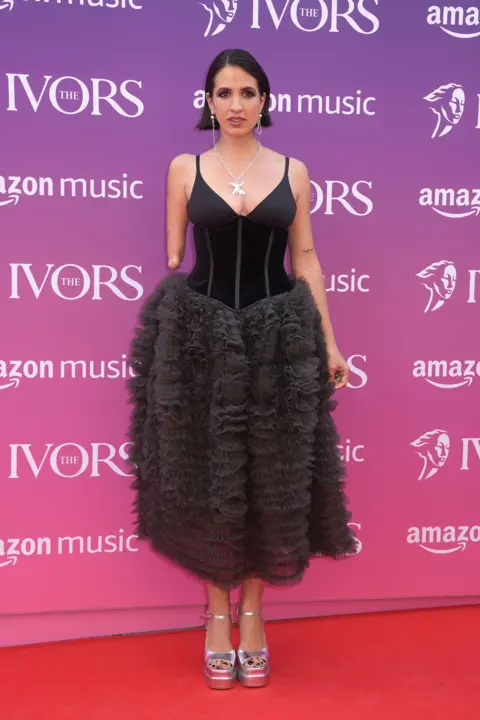 PA Media
PA Media
Victoria Canal also performed a moving, acoustic version of Black Swan during the ceremony
The full list of winners was:
- Best album: Yussef Dayes – Black Classical Music
- Best contemporary song: Speakers Corner Quartet feat Kae Tempest – Geronimo Blues
- Best song musically and lyrically: Victoria Canal – Black Swan
- Most performed work: Dave & Central Cee - Sprinter
- Rising star award: Master Peace
- Best film score: Poor Things - composed by Jerskin Fendrix
- Best video game score: Star Wars Jedi: Survivor - composed by Stephen Barton and Gordy Haab
- Best television soundtrack: The Following Events are Based on a Pack of Lies - composed by Arthur Sharpe
- Academy Fellowship: Bruce Springsteen
- Songwriter of the year: Raye
- Special international award: Lana Del Rey
- Visionary award: Skepta
- Outstanding contribution to British Music: Bernie Taupin
- Outstanding song collection: KT Tunstall

 11 months ago
37
11 months ago
37
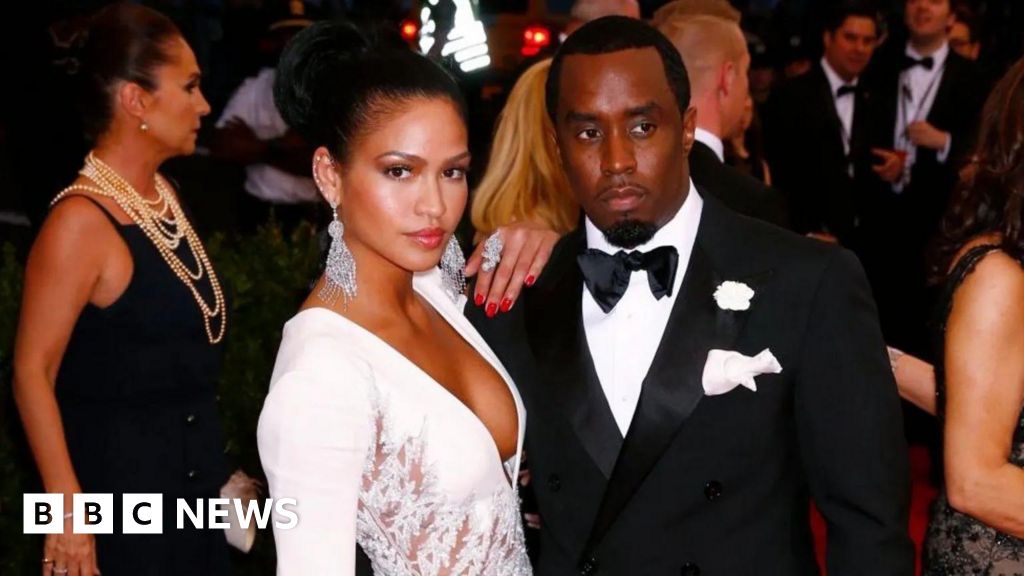

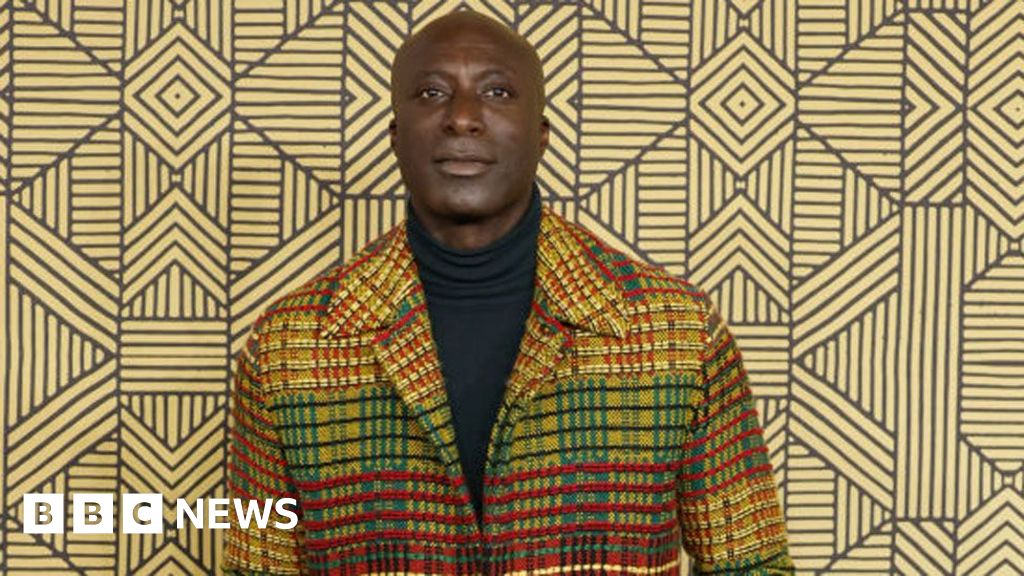





 English (US) ·
English (US) ·